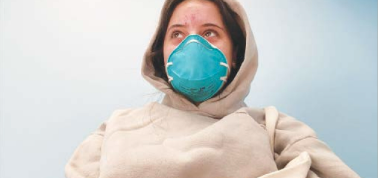Prepare for a new allergy season
With the Snowzilla and cold weather behind, spring like weather has arrived bringing along with it another season of sniffles.
This year, a combination of the mild winter weather in the East and an early March warm up could result in an intense and early-starting season for sufferers.
Most students are relishing in the high temperatures that have been occurring the past week, but for some it is a nightmare.
“My allergies make me dread spring and all because I have to deal with these issues,” senior Jacob Nguyen said. “I try to cope with it by sleeping and taking naps or putting in eye drops. Washing my face also helps.”
Spring break is approaching and it is difficult for students to avoid exposure to pollen during this time.
“Allergy season is really tough to deal with,” junior Nora Hasrat said. “It always hits at the worst time and I am never really prepared to deal with it.”
The transition of seasons prompts an increase in the amount of flower, tree, and grass pollen.
Allergens such as pollen and mold causes the immune system to trigger reactions that cause inflammation in skin, sinuses, and the digestive system. This is what causes people to have itchy eyes and noses, conjunctivitis, and runny noses during allergy season according to Mayo Clinic.
“My eyes always get watery and my throat is always sore,” Hasrat said.
Although allergies are not curable, there are many steps that you can take protect yourself from drowning in a pile of tissues this spring.
Taking antihistamines such as the familiar Benadryl, Allegra, Zyrtec and Claritin can relieve your hay fever. According to WebMD, taking allergy medication before the peak allergy season starts in mid-April will better prevent your nasal symptoms
The effectiveness of each medication varies from person to person due to varying immune system so it is recommended to that you have different brands of each to find out which one works best.
With all these options, they do have some side effects, such as drowsiness.
“I do not want to risk taking medication because it will make me drowsy. I try to prevent this by taking naps after tennis practice,” Nguyen said.
If medications do not work, allergy shots are an alternative option.
In addition, use a humidifier to prevent mold spores from growing in your home and avoiding outdoor activity will prevent allergic symptoms.
If you have to venture outdoors, be sure to monitor pollen counts so that you whether to plan ahead your activities.
For senior Janan Gokturk, her allergies go beyond your typical kind.
Gokturk has a severe pollen and nut allergy. Due to this, she carries around a Epinephrine Autoinjector, or an Epipen as they are commonly called.
This device shoots epinephrine, or adrenaline, into the user’s body and is used for the treatment of anaphylaxis, or a severe allergic reaction.
“I became severely allergic to nuts my freshman year. I’ve never had to use my epipen but I carry it in my backpack and lacrosse bag.” Gokturk said. “My first reaction was during my field hockey game freshman year. I was taken to the hospital on an ambulance.”
Carrying around this device is a primary precaution when having an allergic reaction.
“I have allergies to pollen. I take Allegra and when the pollen count is high I get acupuncture done,” Gokturk said.
Acupuncture is a common method to cope with the symptoms that come along with allergies.
A study from Annals of Internal Medicine showed 71 percent of patients who used this method found relief from their allergy symptoms.
If you normally suffer from spring allergies, you are definitely not alone.
However, if symptoms worsen you must seek medical attention. Following smart allergy prevention tips will ensure you a sniffle and congested free spring.

Sabrina is a senior at Annandale and this is her fourth year on staff. She started out her first year as the sports editor, then the health editor and...













